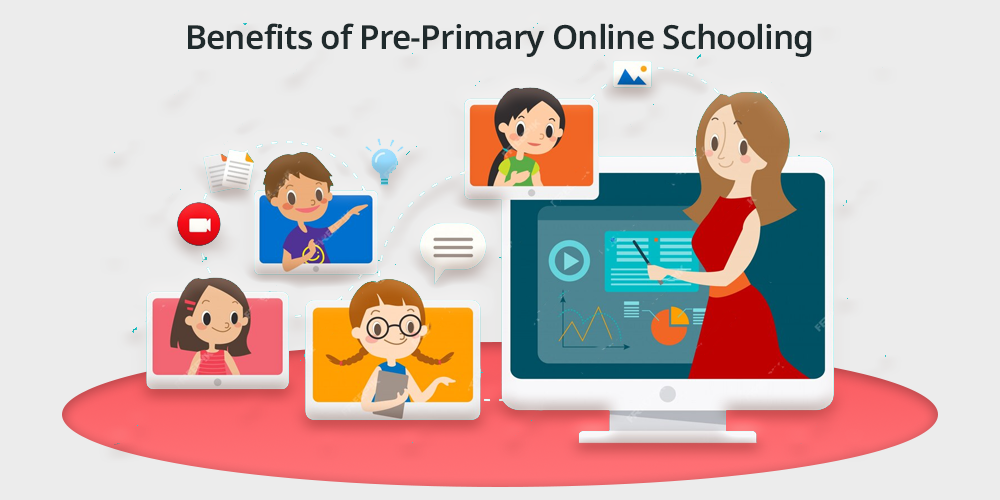
Pre-primary online schooling plays a significant role in shaping the future of learners and the broader society. In today’s digital era, virtual education has evolved from being a mere option to becoming a vital component of early learning.
This mode of learning nurtures creativity, critical thinking, and problem-solving skills—essential elements for holistic development.
It also provides learners with a foundational understanding of how digital platforms function, setting the stage for future academic success.
An often-overlooked advantage of online schooling is its ability to instill consistent learning habits from an early age.
As learners become more familiar with virtual platforms and routines, they gain confidence and adaptability—traits that will serve them well in the years to come.
For families and facilitators, recognizing the potential of online education is key.
A collaborative and supportive approach ensures that early exposure to virtual learning becomes a meaningful and enriching experience for every learner.
Contents
- Understanding Pre-primary Online School
- Key Benefits of Pre-primary Online Schooling
- 1. Flexible Learning Schedule:
- 2. Early Exposure to Technology:
- 3. Safe and Comfortable Learning Environment:
- 4. Personalized Learning Experiences:
- 5. Parental Involvement in Early Education:
- 6. Interactive and Engaging Digital Content:
- 7. Development of Basic Cognitive and Motor Skills:
- 8. Cost Effectiveness as Compared to Traditional Schools:
- Challenges and Considerations in Pre-Primary Online Schooling
- Conclusion
Understanding Pre-primary Online School
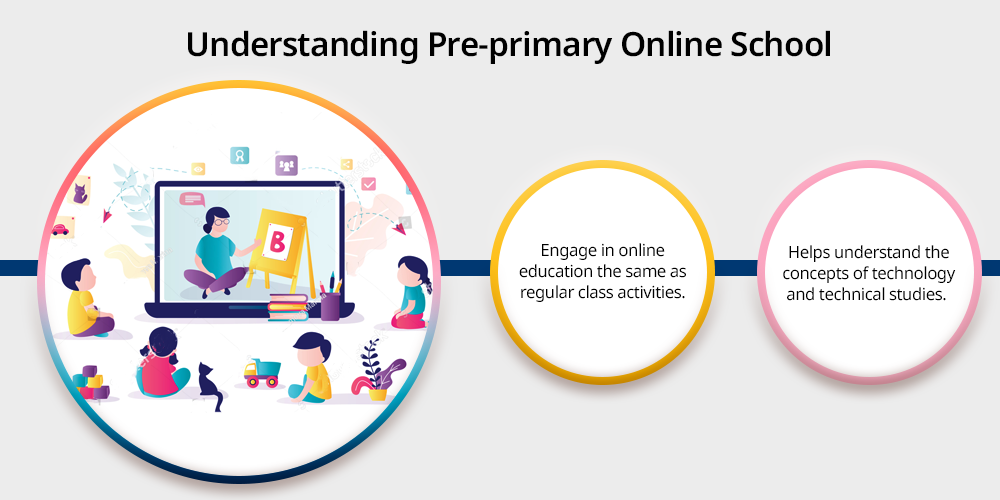
Pre-primary online schooling is a modern approach to early education that introduces young learners to structured learning through digital platforms. This format allows learners to adapt to remote environments while developing familiarity with technology and digital tools from an early age.
Reputed platforms such as 21K school, K8 school, and Dreamtime Learning offer comprehensive programs that mirror traditional classroom experiences through engaging virtual sessions.
These platforms integrate interactive fun learning activities, storytelling, music, and creative tasks to make learning both effective and enjoyable.
Online education supports learners across age groups in enhancing their skills through flexible and accessible formats.
With continued advancements in technology and delivery methods, virtual learning has emerged as a powerful and practical alternative, particularly in the Indian education landscape.
Its growing popularity can be attributed to several advantages, including affordability, convenience, diversity in learning content, and the promotion of equal opportunities.
As digital learning continues to evolve, it is redefining how early education is experienced and accessed.
Key Benefits of Pre-primary Online Schooling
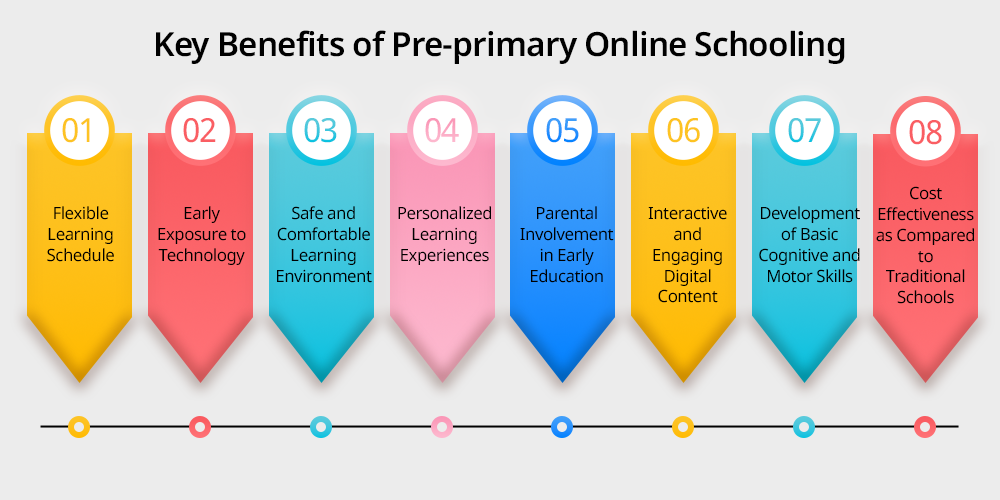
Pre-primary online schooling offers a broad range of advantages, helping young learners develop digital literacy while fostering social and emotional growth. It also provides flexible learning opportunities tailored to individual needs.
Here are some of the key benefits of pre-primary online schooling:
1. Flexible Learning Schedule:
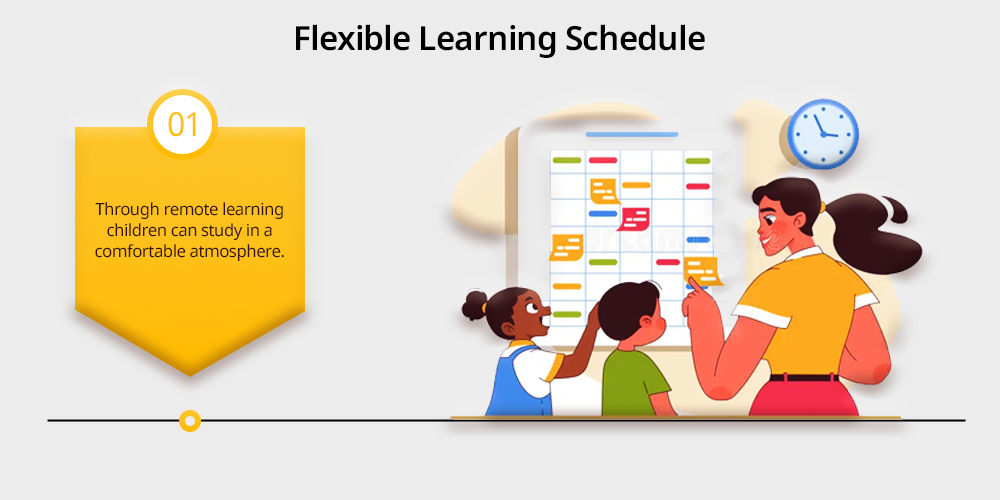
One major advantage is the flexibility to learn from the comfort of home. This stress-free environment helps reduce anxiety and supports cognitive development by allowing learners to progress at their own pace.
2. Early Exposure to Technology:
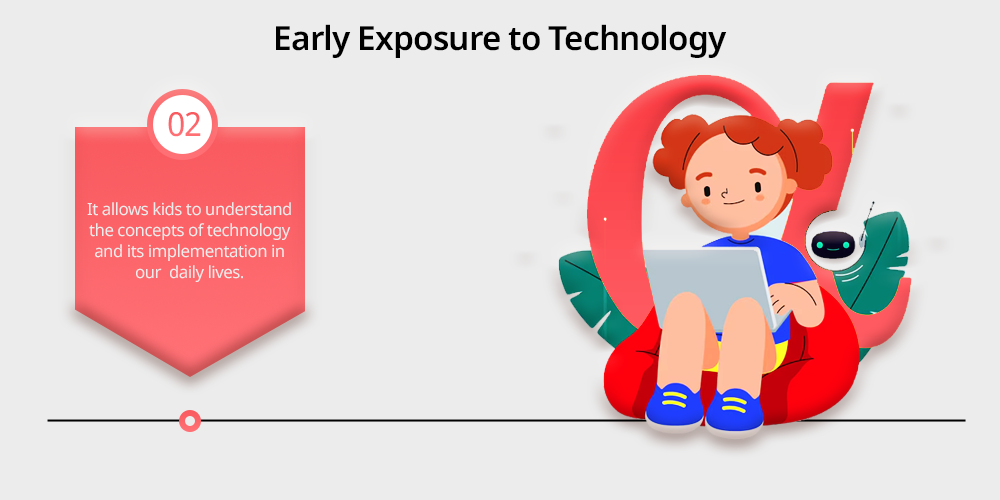
Online schooling introduces age-appropriate technology and digital tools early on, helping learners build essential digital literacy skills.
This early tech exposure equips them to navigate digital environments confidently in everyday life.
3. Safe and Comfortable Learning Environment:
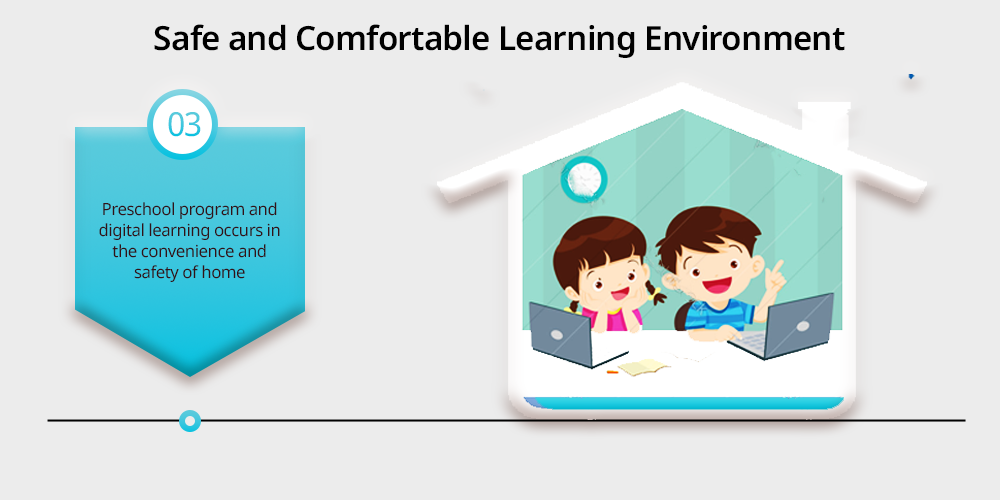
Learning from home offers a secure and convenient setting that supports health and safety.
Additionally, online schooling increases accessibility for learners who may be geographically isolated, differently-abled, or socially disadvantaged, promoting educational equity.
4. Personalized Learning Experiences:
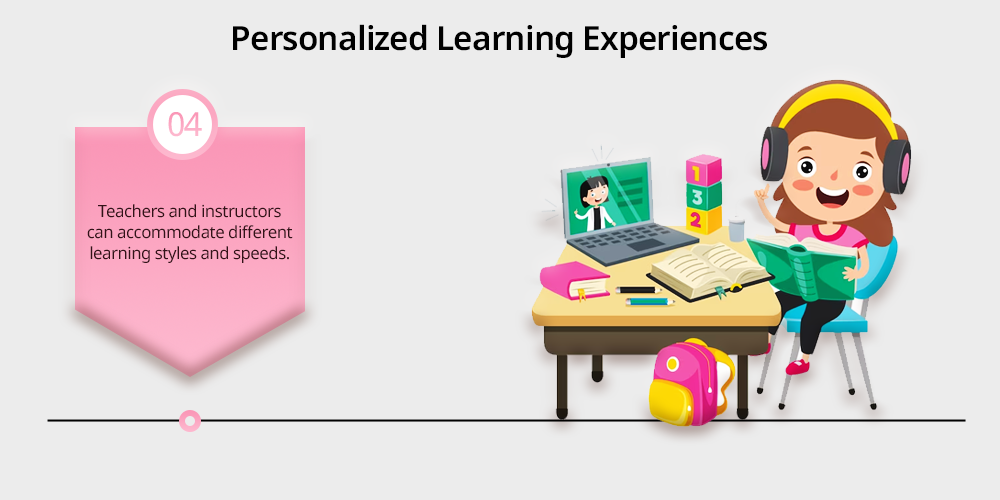
Facilitators can tailor instruction to match various learning styles and speeds through adaptive online platforms.
This personalized approach allows each learner to focus effectively on their individual learning journey.
5. Parental Involvement in Early Education:
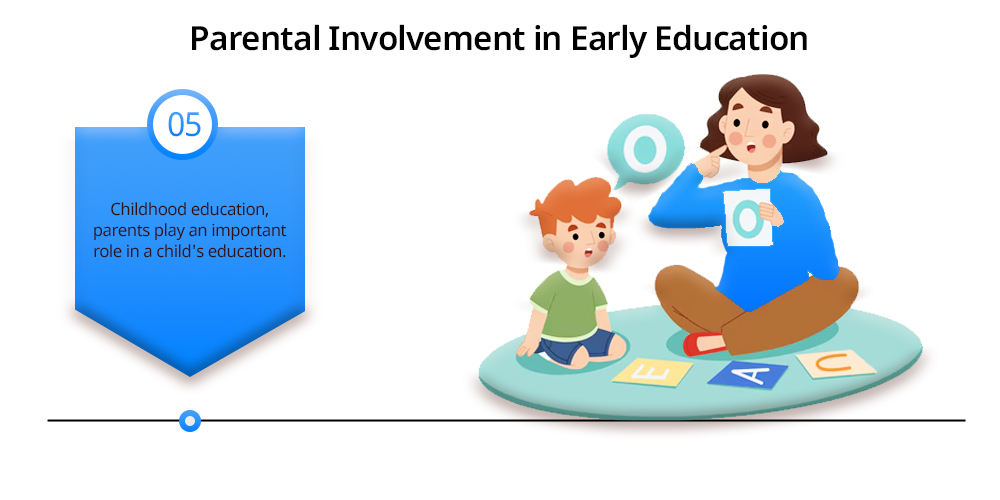
Parents and families play a vital role in early education. Online schooling enables caregivers to be actively involved in the learning process, helping to identify strengths and areas for improvement while fitting education smoothly into daily routines.
6. Interactive and Engaging Digital Content:
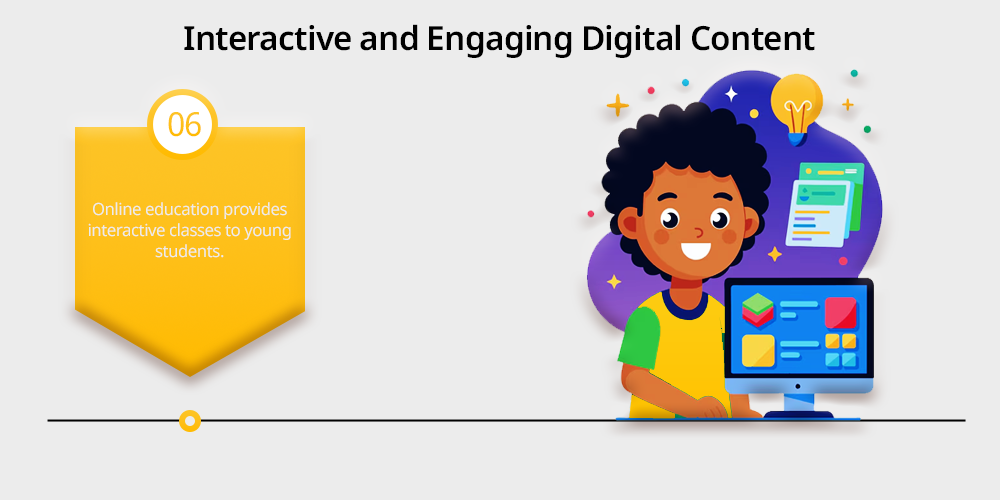
Digital lessons often incorporate games, stories, music, and hands-on activities, making learning both fun and effective.
The use of gamification and extracurricular activities keeps learners engaged and enhances understanding.
7. Development of Basic Cognitive and Motor Skills:
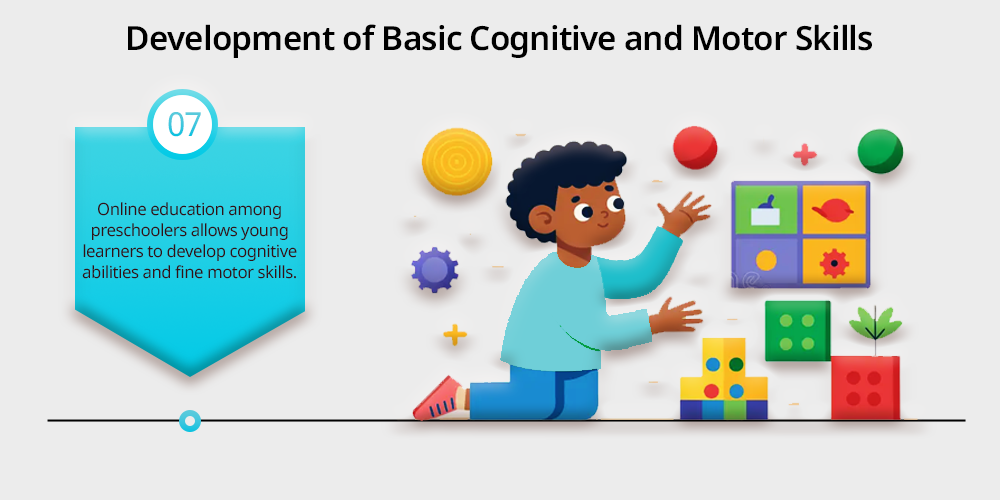
Online education among preschoolers allows young learners to develop cognitive abilities and fine motor skills.
Online learning improves critical thinking abilities through interactive games, problem-solving exercises and captivating content which is known for the development of fine and gross motor skills.
8. Cost Effectiveness as Compared to Traditional Schools:
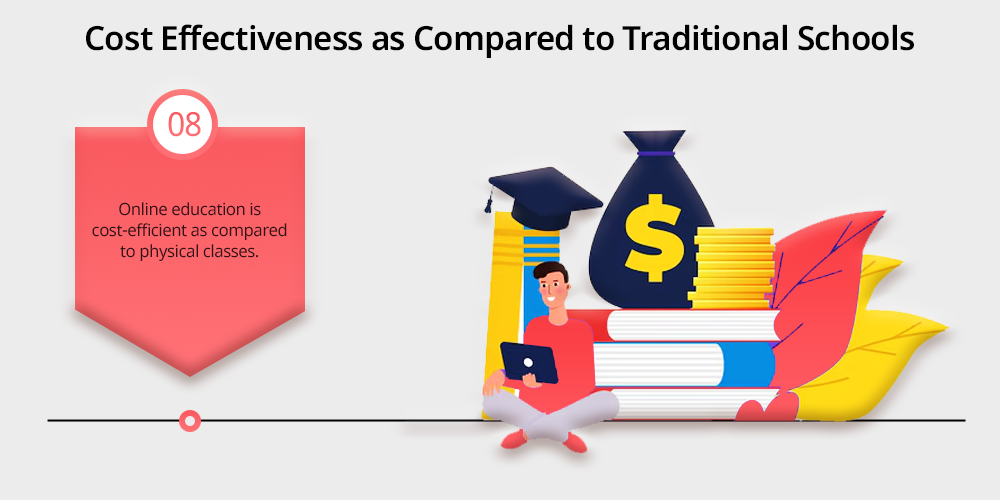
Online education is cost-efficient as compared to physical classes.
Due to lower operating costs as well as lower expenses for resources and transportation online education is considered as affordable than traditional classroom.
This allows students who are financially constrained to easily acquire an education.
Challenges and Considerations in Pre-Primary Online Schooling
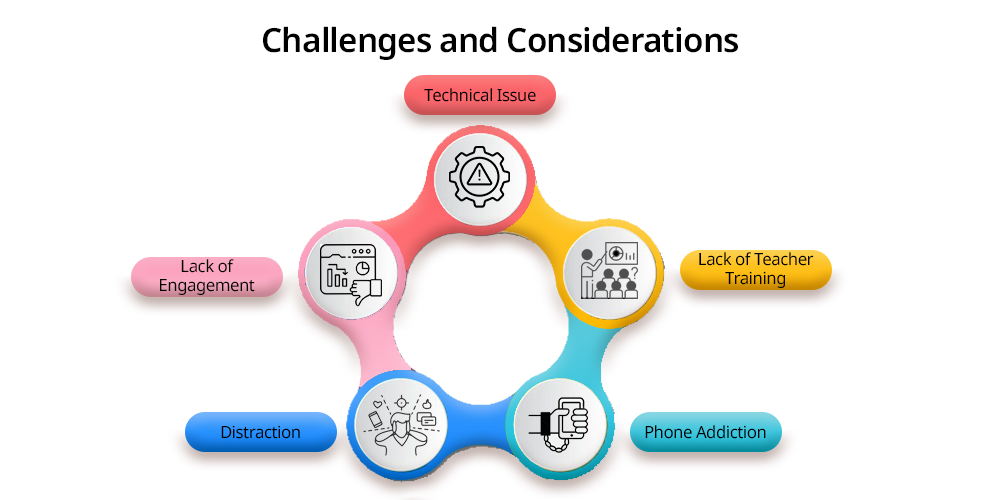
While pre-primary online schooling offers many benefits for young learners, it also presents certain challenges that can impact the effectiveness of virtual early education.
Understanding these obstacles is essential for creating a better online learning experience.
- Technical Issue: Reliable internet connectivity remains a significant challenge, especially in rural or underserved areas. Interruptions in wireless signals during online sessions can disrupt the flow of learning and affect both learners and facilitators.
- Lack of Teacher Training: A major barrier to successful online education is the lack of adequate training for facilitators. Many are still adapting to virtual teaching tools and methods, which can hinder meaningful interaction and engagement with learners.
- Digital Device Addiction: Excessive screen time can sometimes lead to dependency on phones or tablets. Without proper guidance, young learners may become distracted by unrelated online content, which can affect their focus and well-being
- Distractions at Home: The home environment, while comfortable, can also be filled with distractions like television, toys, or background noise. These distractions make it challenging for learners to maintain attention and stay motivated during online sessions.
- Lack of Engagement: Maintaining engagement in a virtual setting requires facilitators to create interactive and fun learning experiences. Without social interaction and stimulating activities, learners may quickly lose interest and enthusiasm for online schooling.
Addressing these challenges through improved technology, facilitator training, structured routines, and interactive content will enhance the online learning experience for young learners, ensuring they receive the full benefits of pre-primary virtual education.
Conclusion
Pre-primary online education offers young learners a valuable opportunity to develop critical creativity and digital literacy from an early age.
Through personalized learning experiences, flexibility, and a safe environment, online platforms can significantly enhance each learner’s educational journey.
However, to fully realize the potential of virtual early education, challenges such as technical difficulties, facilitator readiness, and home distractions must be effectively addressed.
By working together—parents, facilitators, and policymakers can create a more engaging, accessible, and supportive online learning environment for early learners.
Embracing both the benefits and the challenges will ultimately help shape a brighter future for learners and society as a whole.
